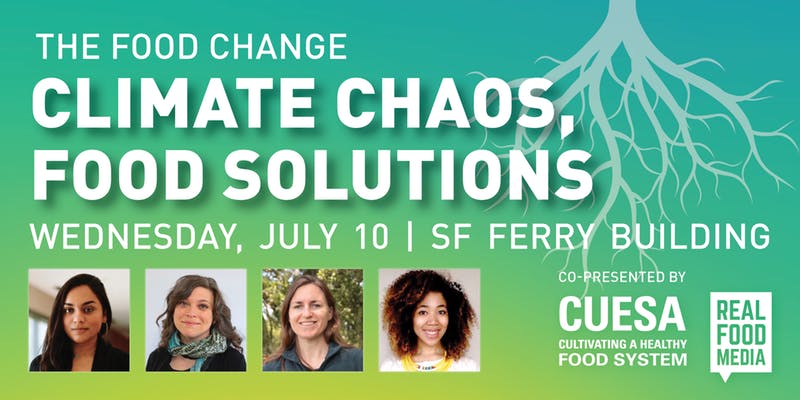By Tiffani Patton
It is easy to feel overwhelmed and hopeless when thinking about the climate crisis. Just this year I’ve learned about the chilling possibility of: an insect apocalypse, a sky without clouds, and a mass species extinction. This is a pretty bleak picture of the future, yeah? Yet, there’s hope!
Tackling the global industrial agriculture system has the potential to mitigate this crisis, and there are a lot of people out there doing just that. Last week, I spoke with a few of those inspiring changemakers at Climate Chaos: Food Solutions, a CUESA talk that brought activists together who are working to leverage the knowledge and power in our food system to combat the climate crisis.
I moderated a rockstar panel featuring Janaki Jagganath, former director of the Community Alliance for Agroecology and third-year law student at UC Davis School of Law; Karen Liebowitz Director of the Perennial Farming Initiative; and Sara Tiffany of Community Alliance with Family Farmers. I was thrilled to get to better know these women who are working to change the way food is produced.
We spent the evening discussing the devastating impacts of industrial agriculture, the transformative potential of agroecology, and the work they are doing to change our food system: shaping legislation that protects rural communities from the pollutants of industrial agriculture, supporting farmers in adapting climate-resilient practices, and creating carbon-neutral dining experiences.
And while we can’t all engage at those levels, there are many things most of us can do: Reduce food waste, make sure to compost, talk to our local farmers, vote for people who support sustainable farmers and rural communities. Another key takeaway: don’t believe the hype of a silver bullet that lets us off the hook from doing the deep systemic and cultural work that needs to happen—whether it’s the (false) promise of GMO crops or trendy meat alternatives (we’re looking at you, Impossible Foods).
There isn’t one single panacea to the climate crisis—especially not one bestowed by corporations— but there are many strategies our communities can use to build resilience in our soil and in our food systems.
Want to learn more about the food and climate connection, including fun and effective (and even delicious) ways to take action? Check out our organizing toolkit, Tackling Climate Change Through Food.



